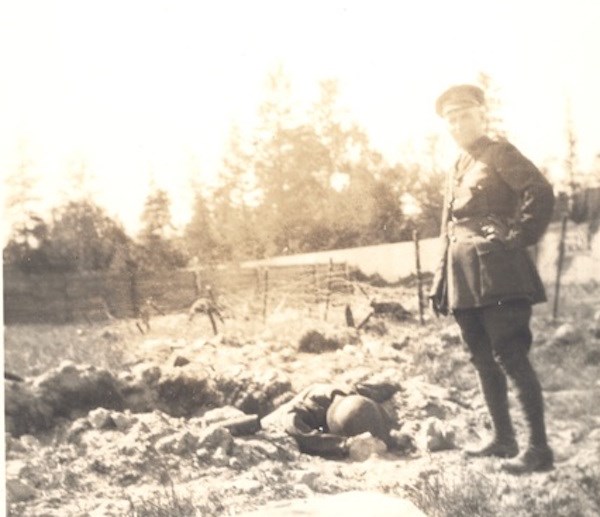From the archives of the Sault Ste. Marie Public Library:
*************************
Remember This . . . William Merrifield . . . A War Hero!
One of Sault Ste. Marie’s greatest war heroes William Merrifield or “Bill” as he preferred to be called was the recipient of six medals during the First World War, including the British Victoria Cross.
Sergeant William Merrifield is the only individual from Northern Ontario to be a recipient for this medal which was the highest honour the British Empire can award.
William Merrifield’s family related that they always believed that he was born in 1892 in Sudbury, Suffolk, England however through government documents it was confirmed he was born in Brentwood, Essex, England in 1890.
He immigrated to Canada and other members of his family were to follow later however before they could make the move to Canada his mother passed away.
Genealogical records show that his father died in Welland Ontario in 1931.
Merrifield worked on the CPR in Sudbury before he came to Sault Ste. Marie where he began working as a fireman on the ACR. Britain and Canada entered the First World War on August 4, 1914 and William Merrifield enlisted on August 14, 1914.
Merrifield was a member of the first contingent of 129 men to leave the city and by September he was sent to England for training.
He saw his first action in February 1915 at Armentiers and then went to the front lines at Bois Garniere.
Merrifield also participated in the Second Battle of Ypres in April 1915 when the German forces first used gas.
He won a Military Medal for his performance at Passchendale on November 6 and 7, 1917.
On October 1, 1918 Merrifield fought in the Battle of Cambrai where he was head sergeant of the 8th Platoon.
During the battle two German machines guns’ placements had Canadian soldiers pinned down.
Sgt. Merrifield single-handedly charged the German guns and using grenades destroyed the German placements.
It was reported that Merrifield refused to leave the battlefield even though he had been injured.
By the time he was evacuated he had been shot four times!
He was awarded the Victoria Cross for his heroic actions during this battle. The medal that was awarded to him was made from Russian cannons captured during the Crimean War in the 1850’s.
William Merrifield returned to Sault Ste. Marie on May 9, 1919 and was greeted by thousands of cheering onlookers at the train station as the Orpheum Band played.
The Great War Veterans Association which was the forerunner of the Royal Canadian Legion made Merrifield a lifetime member.
Winning the Victoria Cross provided William Merrifield with several encounters with the Royal Family.
King George V awarded the Victoria Cross medal to him on January 27, 1919 during a dinner and ceremony at Sandringham Palace.
When he passed a guard at Sandringham Palace the guard snapped to attention clicking his heels.
William questioned this response noting that this was normally the treatment that an officer would receive.
He learned that the same treatment was awarded to all the Victoria Cross members.
In order to prove the point William was encouraged to step through the gate not once but twice receiving the same response each time! This was a unique experience for a normally humble man.
The Prince of Wales, later crowned King Edward VIII came to Canada on a Royal Tour.
On September 4, 1919 Merrifield was presented to the Prince of Wales while he was travelling along the ACR. When the Prince learned that a Victoria Cross recipient was firing his train he had a member of his entourage take over his job so that he could have a meeting with Merrifield.
In the fall of 1929 William Merrifield joined other Victoria Cross winners and sailed to England to attend a dinner with the Prince of Wales. While there, Merrifield was presented with a silver cigar box from the ACR Bondholders Committee. He also had his portrait painted by K. Forbes which would hang in the VC gallery in Ottawa.
In 1920 he met his soon to be wife Maude Bovington who was working in a jewellry store.
He was determined to marry her and is reported to have said, “I’ll marry her if I have to go through . . . to get her.” Since they were married the following year it appears that she was receptive to his proposal!
Growing up William Merrifield’s son Verne didn’t realize that there was anything particularly special about his father. William never spoke about his wartime experiences and Verne only heard fragments when he was eavesdropping on his father’s conversations with his war buddies.
It wasn’t until his father gave a speech at Edith Cavell Public School on Armistice Day that he realized that his father was special.
Verne Merrifield recounted his father enjoyed good health until 1939 when he suffered a massive stroke at the age of 47.
William Merrifield spent the rest of his days in Christie Street Military Hospital in Toronto until his death on August 8, 1943. He was laid to rest at West Korah Cemetery with full military honours on August 11, 1943. He was honoured by Sault Ste. Marie when the school board named a new school, William Merrifield Public School after him to commemorate his significant contribution to the Great War.
In 2005 Merrifield’s family donated his Victoria Cross medal to the Canadian War Museum, a fitting place for a war hero.
*************************
Each week, the Sault Ste. Marie Public Library and its Archives provides SooToday readers with a glimpse of the city’s past.
Find out more of what the Public Library has to offer at www.ssmpl.ca and look for more Remember This? columns here
